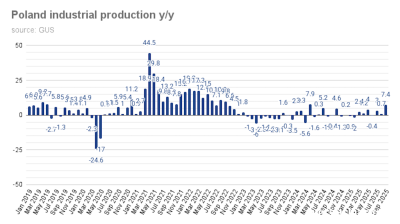Poland’s ruling Law and Justice (PiS) party appeared on the verge of losing power in a razor-edge election, an exit poll showed on October 15.
After a bitter and divisive campaign, Jaroslaw Kaczynski's radical right-wing PiS came in first with 36.8% of the vote, but the opposition parties may be able to put together a majority to oust it from power, the exit poll showed. Donald Tusk's centre-right Civic Coalition scooped 31.6%, with its potential partners the centrist Third Way at 13% and the Left at 8.6%.
"Never in my life have I been as happy as I am today with this second place," an exulted Tusk told reporters.
"This is the end of PiS's rule! This result speaks for itself. No one can take this away from us anymore. We have won democracy. We have won freedom," he added.
In contrast, the reaction from PiS was subdued. "We will do everything to win! Let's wait for further developments now, they can be interesting," said Kaczynski at a no-frills election do at the party's headquarters that lasted just minutes.
But it would take the exit poll to have been very wrong for the results to bring about any surprises now.
"It looks like the opposition can call it," says Ben Stanley, a political scientist with the SWPS University in Warsaw.
"Third Way coming in higher than the polls have been giving them and the Confederation clearly underwhelming were key to the results," Aleks Szczerbiak, a political scientist at the University of Sussex said.
The far-right Confederation – long touted as PiS’ only possible coalition partner – came in at just 6.2%, likely not winning enough seats to help PiS form a new government.
The Civic Coalition is currently expected to win 163 seats in the new parliament. With the Third Way and the Left at 55 and 30, respectively, the opposition has 248 seats, well above the 231-seat minimum required for a majority.
PiS likely won 200 seats while the Confederation won 12.
Turnout was a record 72.9%, 11.5pp more than in the previous vote in 2019, which PiS won.
Should the result stand – the official results are due only in a few days – the election would mark a complete political turnaround in Poland, with big repercussions for Central Europe and the European Union as a whole.
Eight years of the PiS government were characterised by an audacious takeover of state institutions and a prolonged conflict with the European Union over judiciary reforms that Brussels said undermined the rule of law. In PiS’ second term the EU finally began to respond, freezing some vital funding until the party reverses changes that had damaged judicial independence.
Partly in response to this Commission offensive, PiS has pursued an obstructive and destructive policy in the European Council, together with Viktor Orban’s Hungary. This has hampered the EU’s attempts to prepare the bloc to meet the challenges of particularly climate change and growing refugee flows, as well as the reforms and funding needed to cope with a greatly enlarged union in the future.
The opposition’s campaign promised restoration of basic tenets of democratic rule and fixing ties with the EU, as well as the reversing of PiS' dramatic restriction of abortion rights.
The likely opposition coalition is facing a bumpy ride in the foreseeable future. The new government will not have enough votes to overturn a presidential veto. President Andrzej Duda, a staunch ally of PiS, is expected to throw sand in the new government’s gears in a likely strategy to make it unpopular.
Duda is free to nominate a prime minister and with PiS well short of majority, he is now unlikely to nominate a PiS PM candidate.
"Much depends on whether Duda will want to reposition himself now as someone who the opposition can strike deals with," Stanley says.
The political scientist hints that as the new opposition, PiS now has little to offer Duda in terms of his political life after his second – and final – term ends in 2025.
On the other hand, Stanley adds, "Duda still has some leverage" given the likely new government would not be able to overturn presidential vetoes.
PiS still controls the public media and some key state institutions like the Constitutional Tribunal, though Tusk has indicated he will try to change the composition of their ruling bodies as soon as possible.
A referendum on migration, privatisation, and raising the retirement age – called by PiS to support its campaign for the parliament – also flopped badly. The estimated turnout was just 40% - way off the minimum of 50% plus one vote for the results to stand.
A so-called late poll is expected on Monday. The official results should be known by Wednesday.
News
_1761147529.jpeg)
China accuses Washington of “bullying” over visa ban threats in Central America
China has sharply criticised the United States for its decision to impose visa restrictions on Central American officials and citizens accused of ties to the Chinese Communist Party, describing the move as evidence of American “arrogance and bias."

Serbian president calls fire, shooting outside parliament a terrorist attack
The attacker, a retired employee of the former State Security Service, opened fire on a tent settlement of pro-government supporters.

Bolivia's new leader must rebuild a shattered economy
Bolivia enters a new political and economic phase as centrist Rodrigo Paz prepares to take office on November 8, inheriting one of the country’s most acute crises since the hyperinflation of the 1980s.

Hungarian foreign minister says "many actors" worked to prevent Budapest summit
The White House has suspended plans for a meeting between US President Donald Trump and Russian President Vladimir Putin in Budapest.




